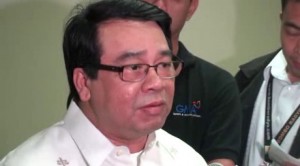Solon sees no evidence of power crisis in 2015
MANILA Philippines – A militant lawmaker expressed doubts about the need to grant President Benigno Aquino III emergency powers after the Energy department failed to present “hard evidence” of a power crisis in 2015.
In a statement on Monday, Bayan Muna Representative Neri Colmenares said Energy Secretary Jericho Petilla did not explain how the power shortage would happen in the summer season next year.
“There is no hard evidence that there would indeed be a power crisis next year. Hindi nga maipaliwanag nang maayos at kapani-paniwala kung kukulangin nga ba talaga ng kuryente sa susunod na taon ay minamadali naman itong emergency power,” Colmenares said.
Although the subsidy to rent or purchase generator sets will be sourced from the Malampaya fund, the congressman still feared that the emergency powers might result in the rising costs of electricity.
He also said power generators might collude to take advantage of the emergency powers.
Article continues after this advertisement“Ang masama pa ay kukuhanan nito ng P6 bilyon-P12 bilyon ang Malampaya funds at iba pa ito sa ipapasang singil sa mga gumagamit ng kuryente. Sa ngayon ay wala pa kaming nakikitang dahilan kung papaano magkakaroon ng kakulangan sa kuryente kung hindi ito sasadyain ng mga energy players,” Colmenares said.
Article continues after this advertisementColmenares said he would ask the operators of power plants to submit a detailed report on their installed and dependable capacities.
“We also want a detailed report on the complete status of each plant as well as their scheduled shut downs. We also want various groups to present their position on alternative approaches other than the use of emergency powers,” Colmenares said.
Aquino has asked Congress to grant him the authority to contract additional capacity precisely to address the looming power shortage during the summer, as granted to him under the Electric Power Industry Reform Act (Epira).
Epira allows emergency powers to the President “upon the determination by the President of the Philippines of an imminent shortage of the supply of electricity.”
“Congress may authorize, through a joint resolution, the establishment of additional generating capacity under such terms and conditions as it may approve,” Section 71 of the law reads.
Petilla had said the agency is expecting a 600 to 800 MW shortage for Luzon in 2015, and that the President must contract at least 300 MW of the total shortage.
The agency had said the thinning power supply might be due to the impending El Nino phenomenon, the maintenance shutdown of the Malampaya power plan, increased or continuing outages of power plants, and the delay in commissioning of committed power projects.
The energy department had told the committee that at least P9 billion will be needed to purchase gensets and P6 billion to rent gensets.
Another option to resolve the power crisis is through the Interruptible Load Program (ILP).
Under the ILP, big industrial and commercial customers who have the ability to produce their own electricity through generating sets should cut off or reduce their supplied electricity, particularly during peak periods of the day, and instead use their own generator sets.
This would allow adequate supply of electricity to other customers who might need it than commercial users. The businesses are also required to contribute their excess energy reserves. But the program is only voluntary, and thus government cannot compel businesses to participate.
Instead of immediately granting Aquino’s request, the leadership in the House of Representatives sought an inquiry in aid of legislation on the need to contract additional power.
RELATED STORIES
Aquino wants emergency powers to solve power crisis
